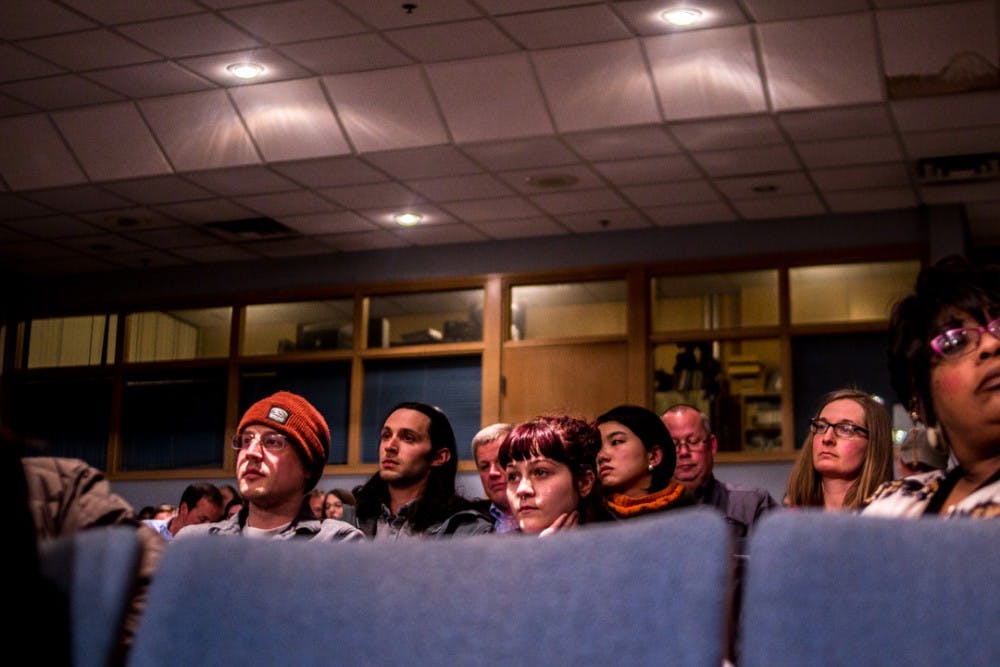In November 2017, pro-marijuana group Let Lansing Vote sued Lansing City Clerk Chris Swope in relation to a referendum attempt to overturn the 2017 Medical Marijuana Ordinance.
Swope said many of the 6,000 signatures originally turned in by Let Lansing Vote were in fact, invalid, lowering the signatures to less than 4,000, the 5 percent minimum of Lansing residents needed for a valid referendum.
“Let Lansing Vote is a group of people who believe that it’s important to let the citizens vote on ordinances of concern,” said Sarah Wilbur, a member of Let Lansing Vote and a medical marijuana patient who goes to many of Lansing’s dispensaries. “The ones (dispensaries) that I frequent as a patient have all been closed."
As previously reported by The State News, 18 medical marijuana facilities, including Capital Dank in Reo-Town and Capital Wellness, have been denied the right to operate within city limits.
In addition to city closures of medical marijuana dispensaries, eight Lansing dispensaries, including Capital Dank, have received state-issued cease and desist orders for not applying by the Feb. 15 deadline for state medical marijuana licenses, according to the Lansing State Journal.
More than 200 cease and desist letters were sent to dispensaries across the state of Michigan.
Let Lansing Vote’s legal fight with the city began in March 2018 with Ingham County Circuit Court Judge James Jamo rejecting the city's motion to dismiss the lawsuit. The case's next stop is at the appellate level.
“We did the vetting of the signatures, and we did our due diligence and made the decisions based on the information we had. … That’s why we came up with what we came up with,” Swope said. “There were a lot of out-of-state circulators, so there were errors on some of the circulator completions, what they had a lot more off were people registered outside the city, people not registered to vote. They keep saying that they turned in over 6,000 signatures, over one-third were invalided or duplicated or various other things. They ultimately came up a little bit short.”
However, Let Lansing Vote paints another picture of the referendum process.
Fundamentally, members of the group think a number closer to 45 dispensaries better suits the size of the Greater Lansing area and its medical marijuana market. They believe their referendum was illegally thrown out by Swope.
“All the circulator error ones we’ve narrowed down to a guy who’s registered to vote in St. Louis city. He wrote that as his county. City Clerk Swope didn’t realize that it’s a legitimate county,” Lansing resident Jarren Osmar said.
Osmar is a founding member of Let Lansing Vote and a vocal medical marijuana activist within the city of Lansing.
“Another guy left an optional box blank, and clerk Swope forgot that it was optional and threw them away," Osmar said.
Osmar and Wilbur said they are frustrated with the growing legal costs brought upon the city with a continued fight in court. They feel they won their case in the lower court.
The city has hired an outside law firm as the lawsuit moves forward, with Mary Massaron of Plunkett Cooney law firm filing the latest motion for the city of Lansing, according to The Lansing State Journal.
“We are 26 signatures shy and those are due to circulator errors alone. Those errors are 343 signatures, 26 shy and they illegitimately dismissed 343,” said Wilbur, who helped review the referendum once it was returned to the group in November 2017.
Osmar pleaded with city officials at the city council meeting on March 26.
Osmar, along with Let Lansing Vote, claim a dangerous precedent could be set if Lansing wins the lawsuit in the appellate court. The organization said their referendum denial was unjust, and they are afraid an appellate court ruling could allow cities across Michigan to throw out citizen referendums with little to no evidence.
“The city clerk suddenly has veto power over all elected officials and and over all public referendums and initiatives. Isn’t that weird?” Osmar said.
Swope is concerned with the legal ramifications of overturning the medical marijuana ordinance in compliance with state law.
Support student media!
Please consider donating to The State News and help fund the future of journalism.
“The odd part is, I don’t understand their fight because if they win in court, then the city is not opted into the state law, and then everyone has to close immediately. The 2017 ordinance is opting into that state law,” Swope said.
The Medical Marijuana Facilities Licensing Act, passed in September 2016, requires cities to pass their own medical marijuana ordinance if any operations are going to legally operate within their cities.
“That 2017 ordnance was our opt in. Looking at the current makeup of the city council, if that gets overturned by the court, then I’m not sure the city is going to pass one, and then how long would we go without weed?” Swope said.
Swope said there is not an easy way for Lansing residents to develop their own medical marijuana ordinance. Zoning ordinances cannot be passed via a public initiative.
“There could be an initiative process, but there are court decisions that say that you can’t do an initiative on a zoning ordinance. It wouldn’t be able to be a zoning ordinance,” Swope said. “I don’t know how the public would feel about having a facility anywhere, so it raises some complications.”
Discussion
Share and discuss “Let Lansing Vote sues Lansing City Clerk over failed marijuana referendum ” on social media.







